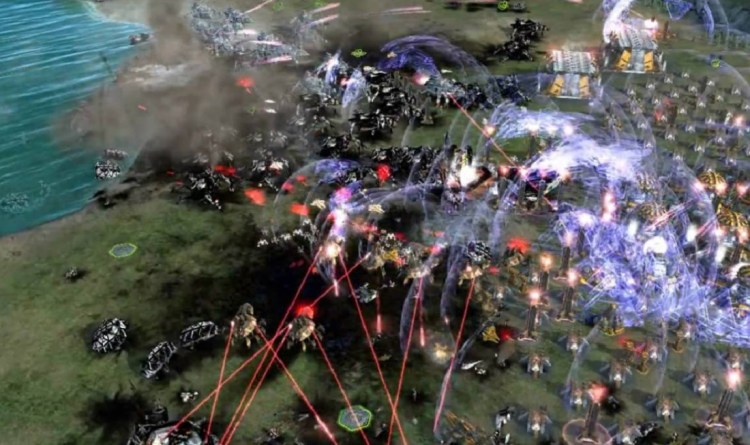In the past nine years, I’ve written around 10,000 stories on games. In this column, I’m going to mention quotes from about 10 of those stories I’ve written. These ten quotes tell me something about the state of the game business today.
I spoke about this at the Devcom event in Cologne, Germany, this week. I called the talk Strategic Zoom, because of Chris Taylor’s game, Supreme Commander. It was a beautiful real-time strategy game where you zoom in on soldiers fighting and zoom out to see the entire battle. You might think the battle is going well when you zoom in. But if you pull out far enough, you might see your forces are surrounded, and the enemy is really winning the battle or the war.
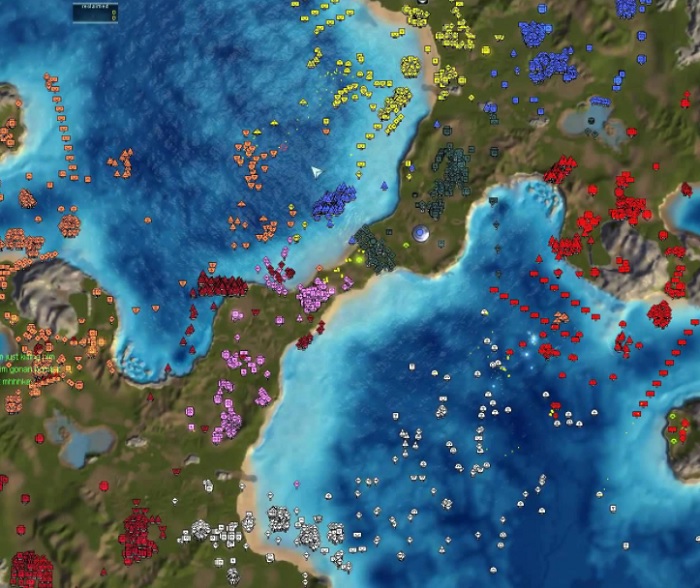
Above: Supreme Commander let you zoom out to see the strategic view.
I’ll start my observations with a familiar figure.
Clinton Foy, managing director of Crosscut Ventures
He is chairman of the Immortals esports team, and he is one of a group of people who just paid an estimated $20 million for the Overwatch franchise in Los Angeles. Why would he pay that much?
“There are not many chances in your lifetime to be part of something that is as big as this. It’s starting a new sport.”
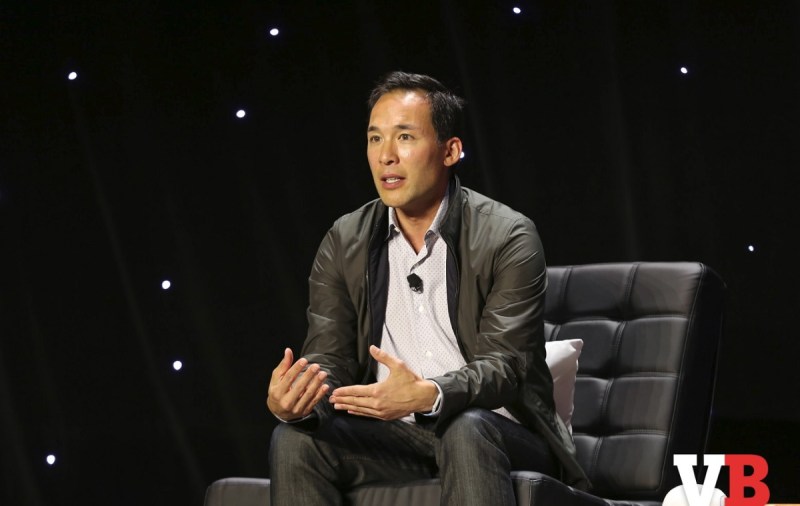
Above: Clinton Foy, chairman of The Immortals.
Clinton’s group is one of 9 investor groups that have paid $20 million each for the rights to a regional Overwatch franchise. Those groups hope to create a league with regional competition, something that hasn’t happened before. They hope they have picked the right sport. Maybe they have. Overwatch had more than 40 million monthly players at last count. At this point, it could be more than League of Legends. Those players aspire to be professionals.
This league is in its infancy. Newzoo says that the NBA makes $75 a year from a dedicated fan. The esports industry makes about $3 per fan now. Among the people who have noticed this opportunity are Scott O’Neil, CEO of the Philadelphia 76ers NBA basketball team, which owns Team Dignitas in esports. Esports now has more players than the NBA.
If the leagues take off, it produces revenues from merchandise, ticket sales, broadcast advertising, endorsements, and fan events. If the revenues develop for esports they way they have for traditional sports, the $20 million purchase of the Overwatch franchise will look like a steal. This means that you should recognize the chance when it comes. You may not get a second chance to be at the very beginning.
Tony Parisi, evangelist for Unity Technologies
“When lies, no matter how brazen, can get us to question the very nature of reality itself.”

Above: Tony Parisi at SVVR.
Tony has been an advocate for VR for decades. But at a speech at the SVVR event, he was disturbed by the results of the U.S. presidential election, where social media was able to influence what happened, and that much of the blame went to fake news. It is so easy to tell a lie on social media and to get away with it. What happens when VR becomes so much more immersive? What happens when the imagery of an imaginary world becomes perfect? We could live our lives in that world and never realize that it is not true.
That’s what movie makers showed us in films like the Matrix. As the producers of the game Orwell have observed, it is easy to shift the blame with big data and so-called evidence. Perhaps we need something like blockchain, a digital ledger, a truth teller, to bring transparency to VR, so that we can at least know for sure what’s real, and discern the pretty lies that do such a beautiful job of keeping us in our own little world. My favorite quote is from Mother Night, a book by Kurt Vonnegut. It is about an American spy who did too good a job as a Nazi propagandist. He did a better job at being a Nazi than he was at being a spy. The quote is, “We are who we pretend to be, so we must be careful about who we pretend to be.”
Mike Gallagher, CEO of the Entertainment Software Association, creator of E3
“The United States does not have the market cornered on creative genius. What we do have is huge momentum drivers.”

Above: Mike Gallagher, CEO of the Entertainment Software Association
I gave a speech at Casual Connect in Berlin about where in the world the game jobs are. Nations should pay attention to this, because their economies will depend on the digital economy, and in particular, the game economy, in the future. Canada is No. 3 in job postings in the world for game development. The job postings in the U.S. have fallen 65 percent in the past three years, according to Indeed.com. The No. 1 job creation region in the world right now is Seungwon, South Korea. Your country should be doing almost everything in its power to ensure that it is competitive in games because the world is flat. Games can be created anywhere, and the jobs will be created where the last brilliant hit game franchise was born.
So what do you need to create? You can’t just legislate a hit. You have to get the right blend of creativity, science, and business conditions.
Strauss Zelnick, CEO of Take-Two, maker of Grand Theft Auto
“It’s that ephemeral sweet spot of character development, graphics, music, look and feel, and gameplay. You need all of it. We had great gameplay in Evolve, but we were sort of missing the story. We’ve had other situations where we had a great story, but the gameplay wasn’t adequate. When we get all of it right, like with GTA — great story elements, great character, graphics, look and feel, great gameplay — you see what happens.”
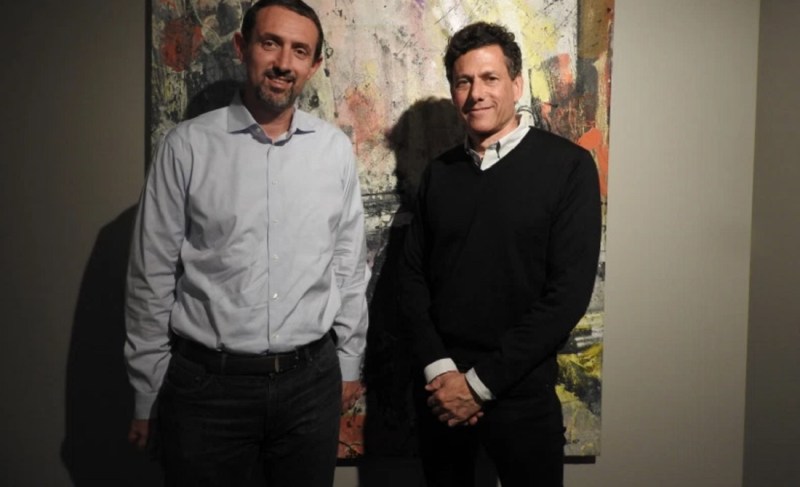
Above: David Ismailer (left), president of 2K, and Strauss Zelnick, CEO of Take-Two Interactive.
GTA has driven Take-Two’s revenues for a few years now. When someone else is making Grand Theft Auto, and you are making something smaller, you are going to lose. That’s what we call bringing a knife to a gun fight. You either show up with everything it takes to make Grand Theft Auto or you get out of its way. And getting out of its way is not a bad idea, because someone else has already invented Grand Theft Auto. You have to be innovative.
Ammar Zaeem, cofounder of Fizz and Caramel Tech Studios in Pakistan
“In the next five years, Pakistan will be big.”
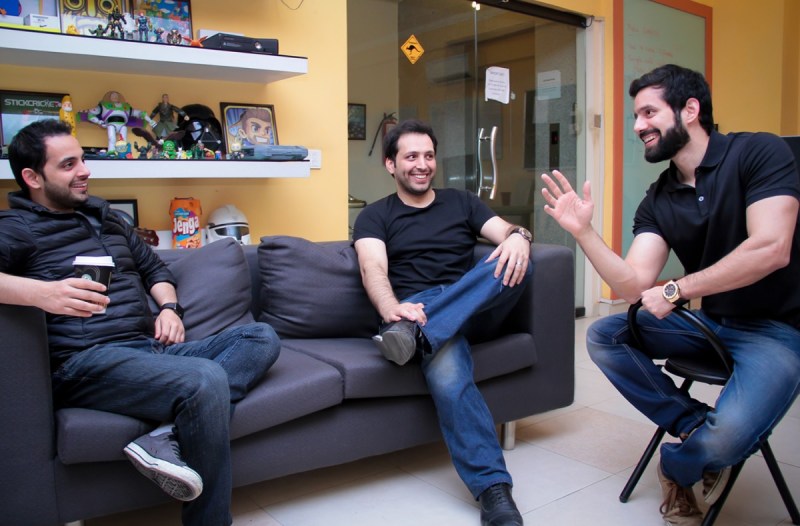
Above: The Zaeem brothers: (left to right) Saad, Ammar, and Shayen.
Ammar Zaeem and his two brothers grew up playing games in Pakistan. They started making web sites for money while they were young. Their father forced them to watch The Pirates of Silicon Valley. They used their learnings to create a work-for-hire company. They were at the bottom of the food chain. Their lucky break came
When Australia’s Halfbrick asked them to make a version of Fruit Ninja for the Nokia Symbian platform. It wasn’t an important platform, but it was work. It enabled them to hire people. They made more games for hire and set up their company in 2011. They started making their own mobile games. They have had some hits, and have moved on to create a new startup, Fizz, which is a platform, higher on the food chain. They are creating a multilingual chat platform for games that can translate text in real-time. They are evolving, moving up the food chain, and choosing their stepping stones wisely.
Countries can do this too. They can start out small, foster an industry, evolve over time, and eventually create a whole game industry. If you are the United States, you should not be complacent. Because anybody in the world can come up with a better game, and the jobs in the industry will shift.
Vander Caballero, CEO of Minority Media, VR developer
“It’s not easy to change behavior and expectations. It takes years. We’re getting better and faster at doing that, but the change VR represents is huge. … It’s pretty close. It’s just a question of how we survive the desert.”
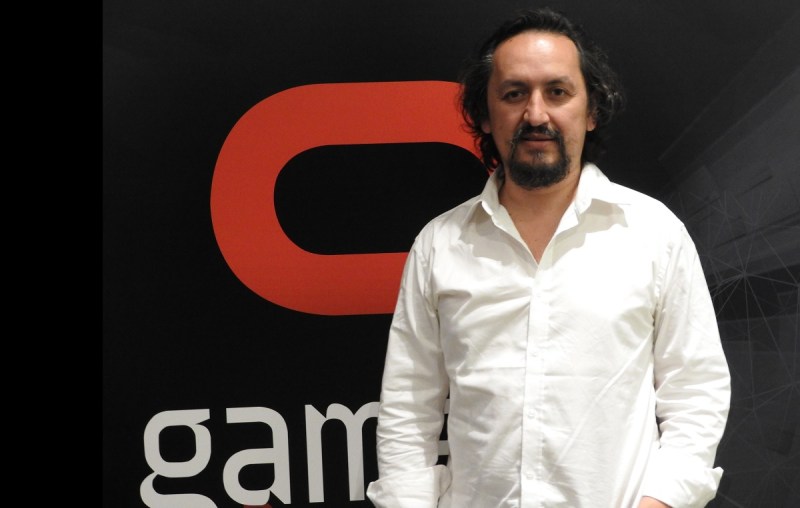
Above: Vander Caballero of Minority Media at Gamelab.
The VR desert is real. We thought 2016 would see huge VR demand. It didn’t come. It was too expensive. The expectations were missed. The investors who wanted a quick payday now realize their error. Startups realize they don’t have enough money. Platform owners are stepping up, but not enough. Many VR companies are going to die. If you are preparing to survive, you must get through the desert.
You might be able to find few ways to do that. You can get lucky and raise enough money because you’ve got the right plan. You can keep your team small and experiment over and over until you get it right, and keep your burn rate low. Then you can spend money for the time when the market will arrive. Or you can do what Paul Bettner at Playful and Hilmar at CCP Games have done. They have repurposed their VR content for 2D screens. They develop groundbreaking work on the new VR platform and they keep their developers inspired.
But then they make money by retargeting their VR IP to non-VR markets, where the volumes are much higher. You can be pioneer in new markets, but don’t forget about the old ones.
Phil Harrison, venture capitalist at Alloy Platform Industries
I asked him a question about platforms, and whether some are intentional game platforms or accidental ones.
“It’s a good question. Which would you rather be: a focused platform company with a smaller balance sheet or an unfocused company with a very large balance sheet? Ultimately a strong balance sheet is a good thing to have, which is why a company like Amazon could end up being a disruptive force in games. They have Amazon Web Services as this secret provider of incredible services to so many games companies, which they’re monetizing like crazy.”

Above: Phil Harrison (left), partner at Alloy Platform Industries.
The game platform owners are many things. They want to change the world and dominate it, and sometimes they don’t care about games. Sometimes they realize that games are a means to an end. They view them as the perfect stepping stone, a pawn on a larger battlefield. One platform owner might view games as a pawn in a game of chess. Another might view games as a queen. That is where I would place the bet. Sony, Microsoft, and Nintendo have always been intentional game platforms. Their platforms exist to make money in games. Microsoft has money to spare, and Sony doesn’t. These companies have had the razor and razor blades model. They lose money on hardware and they make money on software. Sony is winning this particular generation. But it has interesting competition. Google, Facebook, Apple, and Amazon are accidental game platforms. They have big game businesses, but they barely notice because they make so much money on other things. If they wake up and they bring their power to bear on games, they could be very disruptive and they already have been. Do they have the attention span to do it? Do they have the will? Amazon has been collecting pieces on the chessboard. It has Twitch. It has Lumberyard. It has AWS, and it has a lot of newly acquired game talent.
Jeff Bezos’ marching orders to his developers like John Smedley are to make games that are computationally ridiculous. You can understand why Bezos wants that. Amazon could afford to lose money not just on hardware. It could also lose money on software. It could lose money on games, and it could wind up as the biggest games company. Like Tencent. That might be their competition. Now they could face antitrust action if they are too blatant about this strategy, but it could work. As a developer, you must understand the differences among the platforms and you have to choose which one makes sense.
John Smedley, head of Amazon’s game studio in San Diego, California
“You’re probably aware that Twitch is now selling games. Streamers can share in that directly. It links publishers and developers — or just developers, since a lot of these games are indies — with streamers. To me that’s a direction I see gaining momentum. I think you’ll see the same thing down the line, where these economies are becoming intertwined.”
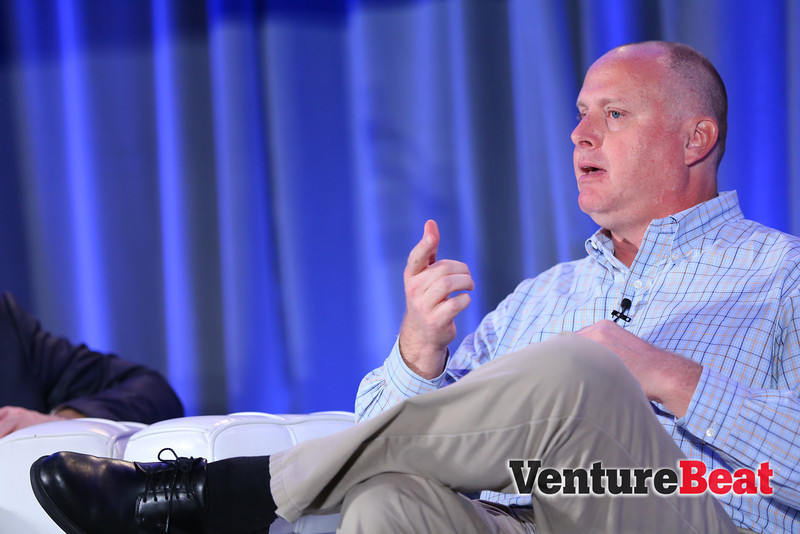
Above: John Smedley, pictured at GamesBeat 2013, is heading a new Amazon game studio in San Diego.
Now we are moving to the significance of livestreaming and influencers. Like esports athletes, these are gaming’s new celebrities. We often idolize creators in the industry like Hideo Kojima. But what if some kid who plays Roblox is the next Kojima? In the past, these people didn’t have a path to greatness. But now they can make money from ads and from tips. Streamlabs has processed more than $100 million in tips for streamers in the past year.
This is another batch of people who are making money from playing games. They can create games in Roblox and get paid real cash for traffic. They can broadcast something funny and collect a ton of tips. If they play a game, a game company will pay them a reward if people download that game. Or they can sell a game directly on Twitch, and they can get a kickback. The money is changing hands in multiple directions, as Smedley noted. It will be fascinating to see where this goes.
Kate Edwards, former executive director of the International Game Developers Association
“As the saying goes, ‘evil triumphs when good people do nothing.’ As long as the game industry lacks the collective, decisive will to truly address and solve the diversity problem right now — which is entirely possible — attracting capable, qualified women and people of color is going to remain a serious problem for the foreseeable future.”

Above: Kate Edwards, executive director of the International Game Developers Association.
Kate left her job at the IGDA and she was able to speak frankly on diversity in an interview. She noted that a few people — mostly women — stuck their necks out to fight the Internet hate that accompanied Gamergate. Intel stepped up to invest $300 million in diversity. But no one else did. Companies joined a diversity in gaming group, but they stayed in the shadows, fearful of criticizing those were their consumers. Then, when Trump imposed his immigration ban, numerous companies stepped forward and made videos and expressed their outrage. The ban was overturned in court, and it was very unpopular. Kate applauded that effort, but she asked where were those companies when Gamergate was happening? Why didn’t they come to the defense of women?
When it comes to diversity, we are fighting the wrong fight. We are fighting for pieces. We are like the kings of Game of Thrones. We are fighting among ourselves in the seven kingdoms. And the white walkers are out there, and winter is coming. We should be fighting them. In the immortal words of Pink Floyd, united we stand. Divided, we fall. That’s what I believe about diversity.
Jon “Neverdie” Jacobs
“We should all get paid to play games.”
You may remember Neverdie as the guy who spent $100,000 on a virtual island that he turned into a nightclub in a virtual world. He ran for president of virtual reality. He has launched an initial coin offering to raise money for tokens that will enable you to take your avatar from one virtual world to another.
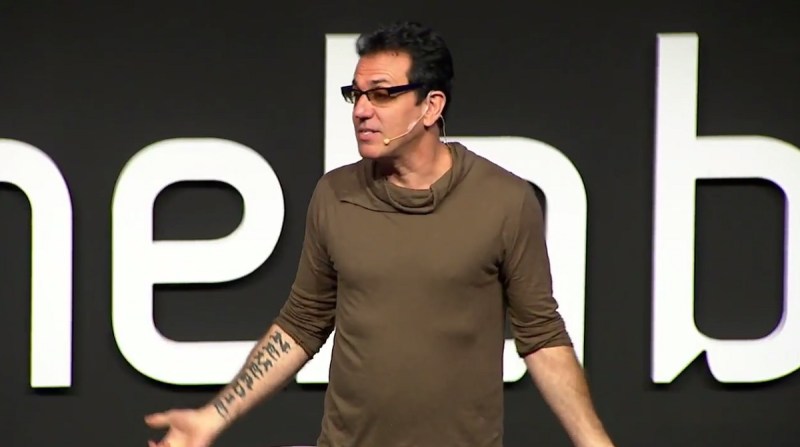
Above: Jon “Neverdie” Jacobs wants you to take your avatars from one game to another.
You can only expect the craziest of ideas to come from Neverdie. Neverdie is worried about artificial intelligence. He fears it will wipe out a lot of jobs, as we all do. If it wipes out jobs, how do we create new ones that will also not be wiped out?
Esports. Livestreaming. Influencers. User-generated content. That’s all part of what I call the leisure economy. A wider and wider group of people will be paid to play games. After all, why do we have to do work? Why can’t we just play. We could get a basic income for it. Facebook can serve us ads, and we would all make money for Facebook.
And this leisure economy is going to be big. Think of self-driving cars. Intel estimates that in the next 20 years, we will develop a passenger economy. It will be a $7 trillion industry to provide services to people in cars who are no longer driving, according to Strategy Analytics. We know that those people will have more leisure time. What do they do with leisure time now? They use a smartphone. And on a smartphone, half of all of our usage time is playing games. 80 percent of the revenue is games. So in the car, in the passenger economy, we could expect that half the time will be spent playing games.
That’s a huge bump in game time. And it will lead to a leisure economy. So maybe Neverdie is crazy, but he has a vision for the future that might not be.
How do I sum this up? I think you have to follow your creative vision. But you must also understand change. You must watch the industry and see how it is changing. As Wayne Gretzky said, skate to where the puck is going to be, not where it is. I’ve been getting paid to play games for 20 years. And I’m going to continue getting paid to play games. We’re going to cover the topic of the Leisure Economy at our GamesBeat 2017 event on Oct. 5-6 in San Francisco.
Disclosure: The organizers of Devcom paid my way to Cologne. Our coverage remains objective.
